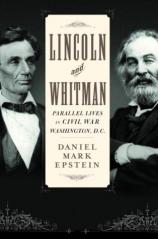Lincoln & Whitman: Parallel Lives in Civil War Washington
Review
Lincoln & Whitman: Parallel Lives in Civil War Washington
One would be hard-pressed to find two men who embody the Civil War
more than Abraham Lincoln and Walt Whitman. Abraham Lincoln, one of
America's greatest Presidents, striving for unity in the midst of
blood-bathed strife. Walt Whitman, one of America's greatest poets,
finding truth in the broken lives of the boys he administered to in
the hospital, years after his famed "Leaves of Grass" was
published. Lincoln read Whitman's poems and saw him living in the
Federal City nearby. Whitman loved Lincoln, his nobility within all
the nation's tumult. David Mark Epstein, biographer of such
luminaries as Edna St. Vincent Millay, Nat King Cole, and Aimee
Semple McPherson, turns his eye towards Lincoln and Whitman as
their lives cross paths during the Civil War.
Tracing their lives from the moment Lincoln reads "Leaves of Grass"
to the elegy Whitman composed after Lincoln's assassination, the
book moves back and forth between Lincoln's actions as President
and reactions to the Civil War (highlighting in particular his
disgust at the toll it was taking on not only the nation as a whole
but families, millions upon millions) and Whitman's actions and
reactions to the war (the most profound segments in the entire book
detailing Whitman's stay in hospitals trying to help those boys who
came back from the war torn, tattered, some crazy, all scarred for
life). Epstein uses newspaper accounts, diaries, poetry, speeches,
and excerpts to make a tapestry of these two lives.
Much, of course, has been written of these two men in a wide
variety of biographies. Epstein ties them together, as Whitman
lived in the Federal City during the war right down the street from
the White House and would see the President come and go on the
street corner; they would nod cordially to each other. The bulk of
the book is more on Whitman's side than Lincoln's side, perhaps
because Lincoln biographies are already rich in number and perhaps
Epstein --- himself is a poet of some repute --- was just
interested more in the life of Walt Whitman. He does spend a great
deal of time discussing Whitman's poem "Where Lilacs Last in the
Dooryard Bloom'd," arguably Whitman's finest work.
Each section is interesting: Lincoln and the tremendous strain the
war put upon him personally and the administration as well; Whitman
writing his book "Drum Taps," poetry about the Civil War, thinking
it his finest work. But the combination, the linkage between
Lincoln and Whitman is tenuous at best. The author reaches for
connections that may or may not have been there. Because Lincoln
uses a few words in a speech that were also in a Whitman poem,
Whitman's poem must have been some inspiration to the speech (and,
of course, Lincoln had to have READ the poem first). When Whitman
uses a phrase in a poem, it must be because of a chance meeting
with Lincoln on a city street or a newspaper account of the
inauguration that he must have read. Lincoln undoubtedly made a
large impact on Whitman. How much Whitman made impact on Lincoln is
questionable. Epstein, however, does his best to cobble their
stories together and even if he does make educated guesses,
stretching this and that, he does so admirably.
Reviewed by Jonathan Shipley on January 22, 2011
Lincoln & Whitman: Parallel Lives in Civil War Washington
- Publication Date: January 20, 2004
- Genres: History, Nonfiction
- Hardcover: 400 pages
- Publisher: Ballantine Books
- ISBN-10: 0345457994
- ISBN-13: 9780345457998




